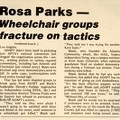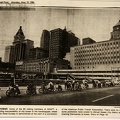Jim Naubacher
disabled In Detroit [column]
Drawing of a man's head
Title: He’s got access -—— to anger
Before the week even started, I was teed off. The American Public Transit Association was coming to Detrolt and so were American Disabled for Accessible Puplic Transit. APTA versus ADAPT.
There was insensitivity to handicappers on the part of city officials; apathy and collaboration by local handicappers nervous about ADAPT's presence, and a general lack of commitment by anyone other than ADAPT to the principle of public transit for all, accessible buses for all.
I wrote a column in mid-September outlining the approaching confrontation. lt had happened in other cities.
ADAPT, an outgrowth of an independent living organization in Denver called Atlantis, had fought for and won a commitment from the City of Denver for total accessibility on its main buses. ADAPT wanted the American Public Transit Association, at its 1983 Denver national convention, to take a similar public stand. lt did not, and ADAPT promised to appear each time APTA convened and protest that decision.
Then I turned the story over to others, since I knew I could not be impartial. They covered the story with words and pictures, but let me tell you about some of the strange, ironic, disappointing and disturbing things that took place beginning Oct. 3 in Detroit.
SAD BUT perhaps not unexpected was the reaction of city officials. In many ways, the city acted like any other city would react. It had wooed and won the APTA and promised APTA officials a safe and peaceful convention in the face of expected ADAPT protests. APTA had faced challenges from ADAPT in Denver, Los Angeles, Washington, San Antonio and Cincinnati before the Detroit convention. City officials were pretty sure they knew what to expect.
What would ADAPT do? They would "do" civil disobedience. They would block buses that were not lift-equipped for wheelchair users. Wheelchair users would try to crawl onto some of these inaccessible buses. But while putting the best face possible on a woefully inadequate mass transit system, the city put the worse possible face on its position toward a mass translt system that is accessible to all.
Just before the APTA delegates arrived, Mayor Young announced that the City of Detroit was buying 100 new buses. He emphasized that the service-poor city would use its own money.
Thls point was notable, since Young made no mention of the new buses' accessibility. Federal regulations require non-discrimination toward handicapped riders and require communities to develop a plan to make their systems accessible. Michigan law requires that each bus bought with the aid of state money must be lift-equipped.
ln response to questions, city officlals said that perhaps as many as 20 - one of five — of the new buses would be lift-equipped.
NOT COINCIDENTALLY, the City of Detroit had entered into an out-of-court settlement 14 months earlier in a federal lawsuit brought by four handicappers against the city on a variety of complaints of non-compliance with federal law regarding non-discriminatlon and accommodation of handicappers. in that settlement, the city had agreed to maintain the lifts on buses and to train drivers in their proper use.
But little has been accomplished. Young's announcement that the city had bought at least 80 percent inaccessible buses underlined the city's position regarding access. it also reminded handicappers that the settlement had not committed the city to providing future accessible, well maintained buses.
In the meantime. efforts were under way to neutralize ADAPT. The Detroit City Council denied the group a parade permit. ADAPT had contacted Rosa Parks, the Detroit woman whose refused to move to the back of a Montgomery, Ala., bus in 1955 gained national attention and sparked protests during a different civil rights struggle. Her representatives said she would not lead a parade, but would hold a news conference. She later said she might attend a press conference, but did not.
CBS reporter Ed Bradley from "60 Minutes" delivered a keynote speech at the APTA convention Oct. 6. Bradley said he had investigated ADAPT found their complaints "didn't hold water."
FORD MOTOR CO. allowed a [bus] full of APTA delegates to use its private property to gain access to a coctail party site that ADAPT members planned to barricade.
The Southeastern Michigan Transportatlon Authorities (SEMTA), which has committed itself to total access of its bus systems by the end of decade, loaned the Detroit police an accessible van so they could [take] ADAPT protesters to jail. Frank Cl[-]one of the plaintiffs in the federal lawsuit against Detroit, provided sensitivity training to Detroit police officers who were expected to be arresting ADAPT wheelchair users.
But the training only extended [so] far. Although there was no "arm twisting or head-beating," as a [police] representative described it, police were unable to appropriately house protesters and provide medical necessities, food and bedding to some who were arrested.
On Oct. 7, Detroit Recorder's [County?] Judge George Crockett felt compelled to issue a writ of habeas corpus, freeing them because of these conditions.J
As ADAPT members went home Oct. 8-9, I was still teed off. This will not be the end of the debate on transportation access in Detroit and across the country.
- Created on
- Thursday 11 July 2013
- Posted on
- Monday 31 July 2017
- Tags
- accessible transit, ADAPT - American Disabled for Accessible Public Transit, APTA - American Public Transit Association, APTA convention, arrests, civil disobedience, driver training, Ed Bradley, Ford Motor Company, habeas corpus, handicappers, jail, Jim Naubacher, Judge George Crockett, maintain lifts, police, recinded permit, Rosa Parks, SEMTA - Southeastern Michigan Transportatlon Authorities
- Albums
- Visits
- 3557
- Rating score
- no rate
- Rate this photo


0 comments